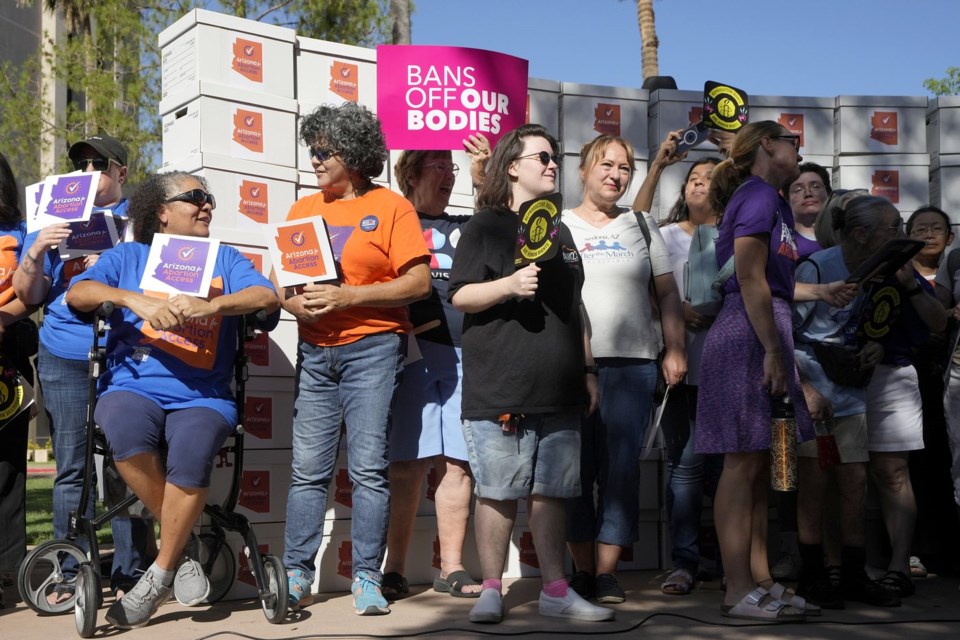Two court rulings Monday bolstered abortion opponents, with the U.S. Supreme Court ruling that if they violate state law and Georgia's top court of the abortion ban in that state.
The rulings are the latest in a legal saga that's been playing out a few rulings at a time across the U.S. for the past two years — since the nation's top court overturned Roe v. Wade, ended the nationwide right to abortion, and opened the door to bans and restrictions, as well as the new legal fights that followed.
Meanwhile, abortion is also a top concern for voters ahead of next month's elections, including in nine states where it's on the ballot directly in the form of state constitutional amendments.
Here are five key things to know about the latest abortion developments across the country.
Texas gets permission to keep barring some emergency abortions
In the fallout of the in Dobbs v. Jackson Women's Health Organization, President Joe Biden's administration told hospitals that federal law required them to provide abortion services when the life of the pregnant person was at risk.
Texas sued over the policy, saying the federal government could not mandate the right to abortions that would violate the state's ban at all stages of pregnancy, with exceptions to protect the health and life of the woman.
On Monday, the U.S. Supreme Court let that ruling stand. The justices did not detail their reasoning.
Georgia brings back ban about six weeks into pregnancy
A weeks after a Georgia judge blocked the state's ban on abortion after the first six weeks or so of pregnancy, the state Supreme Court on Monday put it back into place — at least for now.
The state's top court said the ban on abortion once cardiac activity can be detected, generally about six weeks into pregnancy and often before women realize they're pregnant, can be enforced while it considers the state's appeal of the .
It's not clear how many abortions were provided in the state that could not have been under the ban during the week the rules were relaxed. Some clinics said they were willing to provide abortions after six weeks, though.
The ruling meant that four states again bar abortion in most cases after about six weeks of pregnancy.
Ruling blocking North Dakota's ban becomes official
In another late-September development, a from earlier in the month striking down that state's abortion ban became official.
That means that 13 states are now enforcing bans on abortion at all stages of pregnancy, instead of 14.
But the impact of the ruling in North Dakota is limited to hospitals in the nation's second-least populous state.
The only clinic that provided abortions in the state , Minnesota, after the Dobbs ruling was made and North Dakota's ban took effect.
Voters in nine states are deciding whether to protect abortion rights
Court rulings are not the only place where abortion policy decisions are being made.
are determining whether to add the right to abortion to their state constitutions.
In Missouri and South Dakota, the measures would undo current bans on abortion at all stages of pregnancy. In Florida, it would lift a ban that kicks in after six weeks.
Nebraska has competing measures on the ballot. One would create the right to abortion until fetal viability, generally considered to be around 23 or 24 weeks into pregnancy. The other would enshrine the current ban that kicks in after 12 weeks.
In Arizona, Colorado, Maryland and Montana, it would enshrine, and in some cases expand, abortion rights. Nevada's vote would, too, but to take effect, the measure would have to pass a second time, in 2026.
Additionally, New York voters will decide on an amendment that would bar discrimination on the basis of pregnancy status, though it does not mention abortion by name.
It could depend on the presidential election
Abortion is a major issue in elections for office, too — including the presidential race.
Vice President Kamala Harris has been focusing on abortion rights in her presidential campaign. She says she wants to She talked about it on the this week and in Georgia.
Former President Donald Trump, the GOP nominee, has taken credit for nominating Supreme Court justices who overturned Roe. He says that the issue should be up to the states and, recently, that he would if Congress passed one. He has also said he would , though he has also criticized it as too restrictive.
Geoff Mulvihill, The Associated Press


